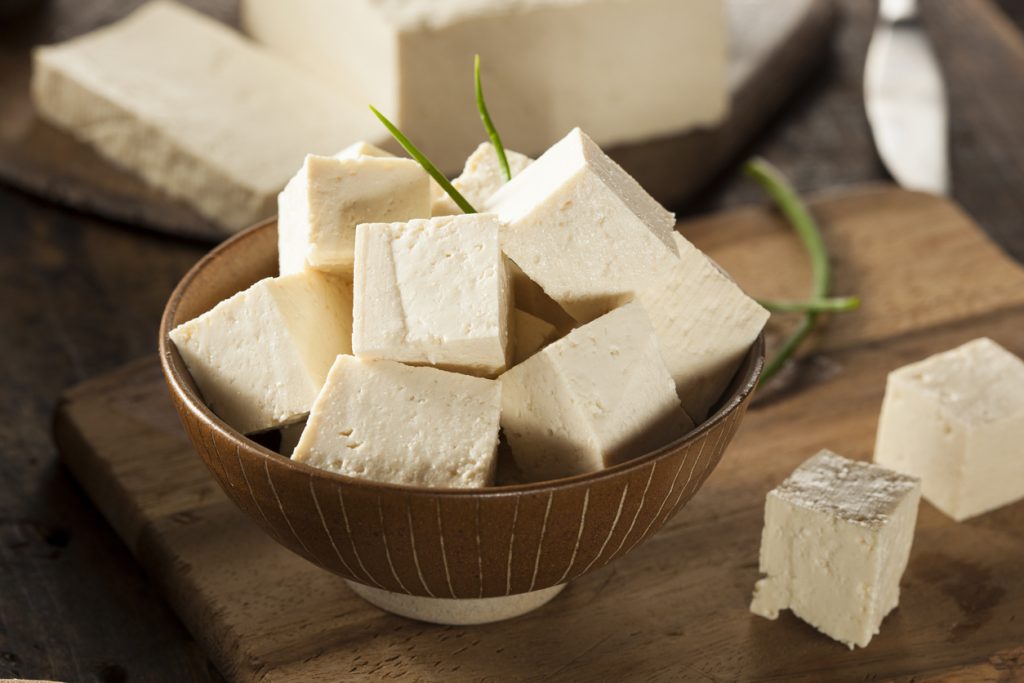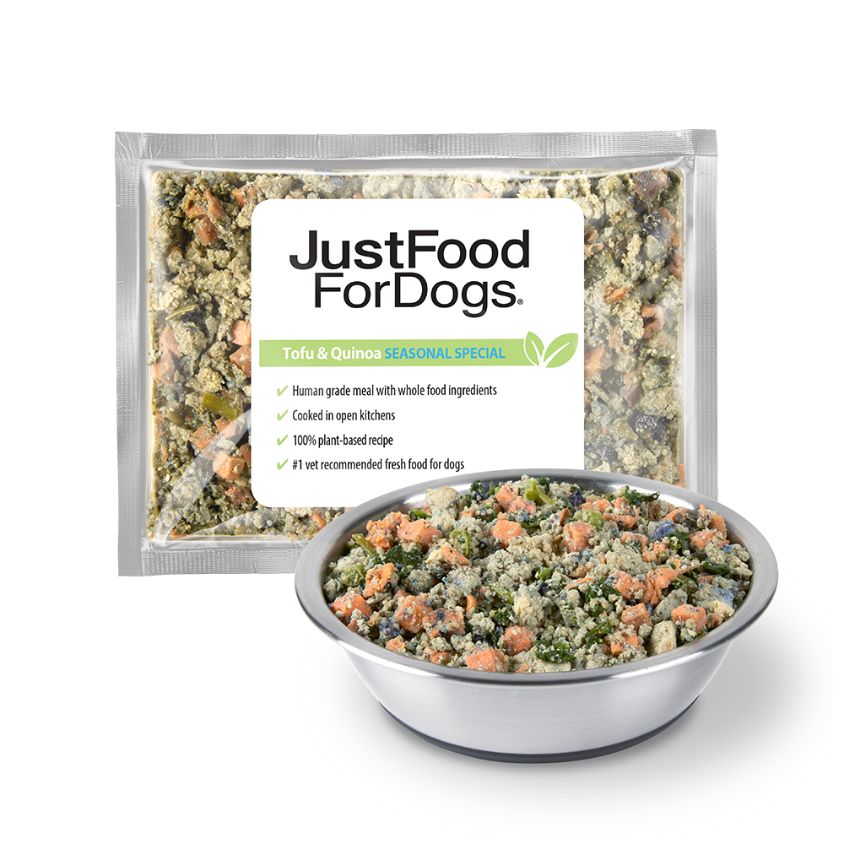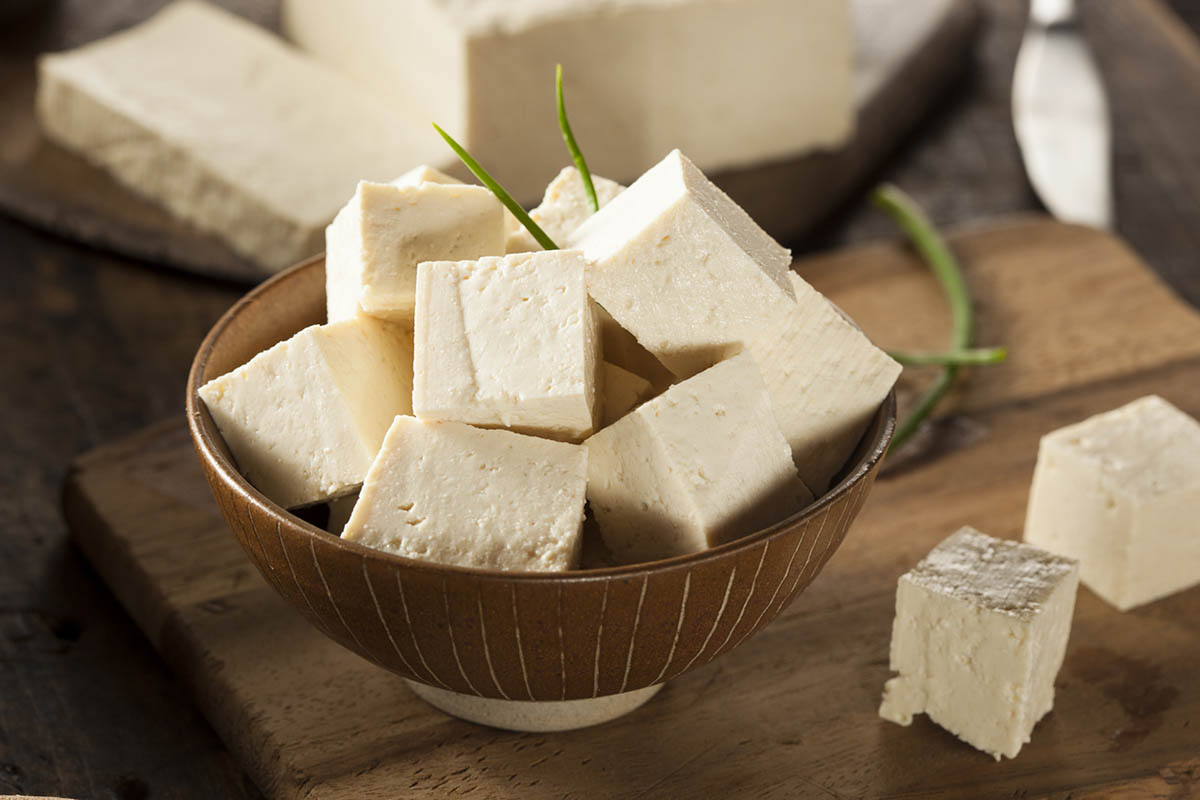By Jen Phillips April
Does your dog stare lovingly at you while you’re eating? I don’t know about you, but I never had a chance at winning a staring contest with my Eskie. That dog would stare at my plate and at me and back to the plate while his tail picked up steam and wagged faster and faster.
What’s a dog mom to do? Our furry friends have mastered the art of the soulful gaze when they want us to share a tasty tidbit.
However, no matter how much you like to share, you’re probably aware your furry friend has a different digestive system. One that can’t always handle human foods like onions, chocolate, or macadamia nuts. Some dogs even have food allergies or sensitivities to wheat, chicken, or pork.
But what about tofu? Can dogs eat tofu? Is tofu good for dogs? Are there health benefits to vegan dog food? Let’s find out more.
What is Tofu?
Long a vegetarian staple, tofu is a soybean-based protein source. Bland on its own, you can bake, sautee, or fry tofu to add protein and extra umami to stir-fries and other dishes. Because it absorbs anything you put on it, you can add any seasonings you like to pump up the flavor.
Texture-wise, tofu can be mushy – especially uncooked. Some dogs like it raw. But let me guess; you’re not considering making your pup a tofu soy-sauce-soaked veggie dish? You just wonder if you can slip your pup a little tofu from your dinner plate?
Is Tofu Safe for Dogs?
Dr. Linda Simon is a veterinarian at SeniorTailWaggers.com; she weighs in on the tofu debate to say, “It is not toxic to dogs but should not form the bulk of their diet, as they thrive on meat and fish-based proteins.” She adds that you’ll want to skip the tofu treats if your dog has a soy allergy.
How do you know if your dog has an allergic reaction to tofu and other soy products? Food allergies and sensitivities often appear as skin rashes, itchiness, or gastrointestinal problems like vomiting, diarrhea, or gassiness. However, soy-related side effects are rare.
How Much Tofu Is Safe to Feed Your Dog
Dr. Simon says, “You should just give a small portion, e.g., one tablespoon, to your dog. This ensures if it does cause an upset stomach or an allergic reaction (rare), any signs should be mild. If your dog tolerates and enjoys the tofu, you can gradually give larger portions.”
Another thing to consider is the seasonings on the tofu. Obviously, if yours is coated in spice, your dog may not like it and probably shouldn’t eat it anyway.
Always keep an eye on your pup for signs of an upset stomach. If your pup seems out of sorts after eating tofu or anything else, you might want to feed your dog a bland diet and give plenty of rest and fluids and see if that sorts your dog in a day or so. Of course, if your dog is obviously distressed or suffering from canine bloat, then you want to get them to the veterinarian immediately.
Health Benefits of Tofu

Tofu gets points for being a low-fat protein source. Dr. Simon says it “may be a good treat for those with pancreatitis and those who struggle to stay slim or who are already overweight.”
Another benefit of tofu is it’s low in purines. Purines are naturally occurring molecules in the body that need to stay balanced. Too many purines can cause inflammation and bladder and kidney stones.
Some dog breeds are more at risk than others of urate uroliths, aka bladder stones. For example, Dalmations and English Bulldogs tend to develop bladder problems, and a low-purine diet that includes a tofu treat can be beneficial.
Dr. Simon says, “Similarly, dogs with liver disease (such as chronic liver failure or liver shunts) cope better with plant-based proteins like tofu.” Additionally, if you find calcium-enriched tofu, Dr. Simon says that could be a nice treat for lactating or pregnant pups or puppies.
3 Potential Drawbacks of Feeding Your Dog Tofu
Anytime you feed your dog something new, watch for unusual reactions. While side effects of feeding tofu are rare, they do occur. Your dog might show food allergy symptoms by developing a rash or itchiness. Other dogs might have digestive problems.
1. Gastrointestinal Problems
Tofu could aggravate digestive issues and cause chronic gassiness or bloating. Canine bloat can be fatal if not treated quickly, so if you can tell your dog’s stomach is enlarged after feeding tofu, take them to the veterinarian immediately.
2. Hormone imbalance
Tofu, soy milk, and other soy-based products can affect your pet’s hormone balance. Why? They contain phytoestrogens, aka plant-based estrogen, which is usually fine in small amounts. But if your dog eats too much of them, they can affect the thyroid, skin and coat, and even your dog’s behavior.
3. Balanced Protein
As omnivores, dogs need a balanced diet that includes meat and vegetables. While tofu has protein, it’s not a complete source of protein for your dog. Keeping a small amount of tofu as an occasional treat while ensuring your pup has balanced meals is better for your dog.
Part of your dog’s diet should include vitamins and minerals like magnesium, calcium, phosphorus, and amino acids. Quality dog food will tell you how much of each nutrient it has on the label.
The Bottom Line on Tofu for Dogs
As you can see, tofu is mostly neutral. It’s not bad for dogs in small quantities and can even make a nice treat for some pups. Especially, if your dog is on a weight-loss program, a small amount of tofu might make a healthy treat. You can break up tofu into curds and prepare it separate from any seasonings you’ll use for yourself and give your pup the bland tofu and see how they like this popular soy protein.
However, tofu is not a complete protein source that meets dog needs. That’s why the JustFoodForDogs world-class nutrition team partnered with leading researchers in vegan dog food to create a recipe that’s high in protein, packed with antioxidants, and full of anti-inflammatory ingredients. And, because the Tofu & Quinoa recipe is 100% vegan, it’s perfect for dogs that need a novel protein and for pet parents who are looking to reduce their impact on climate change. To ensure your favorite four-legged pups are getting their nutritional needs met with a complete diet, talk to your vet.

This content is for informational use only and does not replace professional nutrition and/or medical advice, diagnosis, or treatment. It is not a substitute for and should not be relied upon for specific nutrition and/or medical recommendations. Please talk with your veterinarian about any questions or concerns.
